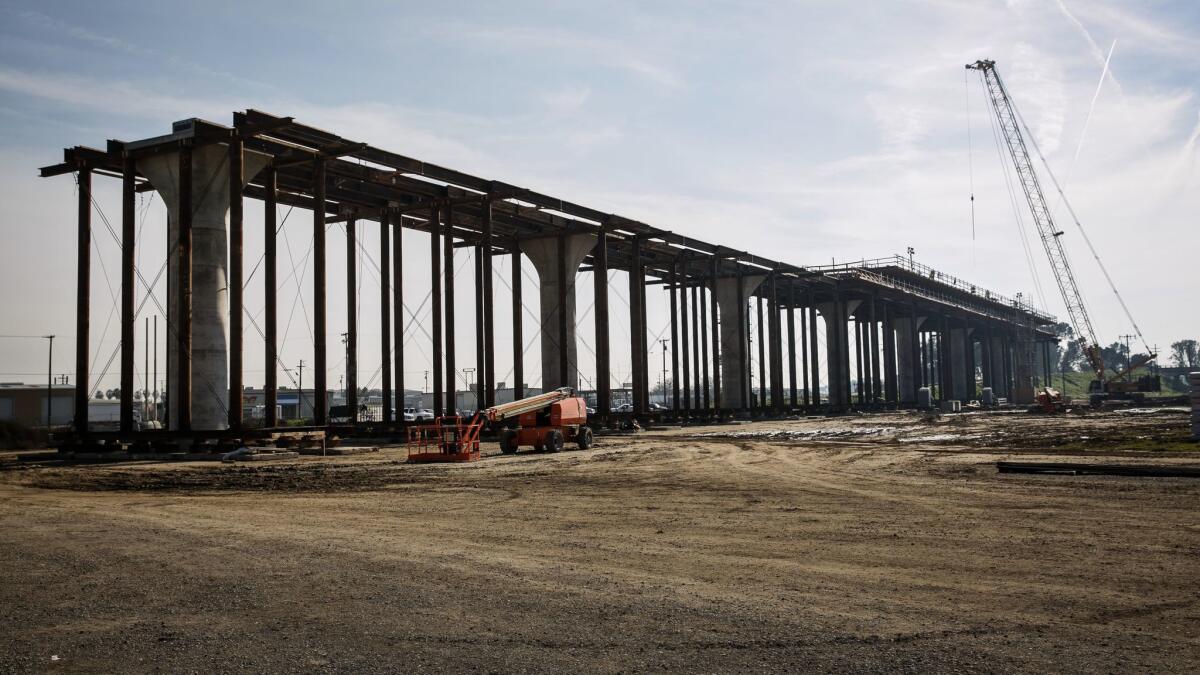New legal challenge to California bullet train is filed in Superior Court

- Share via
Opponents of the California bullet train alleged in legal papers filed Tuesday that the California legislature violated the state constitution when it passed a law last year amending and modifying the $9-billion high speed rail bond act that voters approved in 2008.
If the suit further delays access to the bond money, it could slow construction over coming years.
But state officials say they do not anticipate any immediate problems as a result of this litigation, though lawsuits have effectively blocked the use of the bond money for years.
The papers were an amendment to a suit filed by opponents in December, in Sacramento Superior Court, which asserted that a funding plan to spend the bond dollars was illegal and should be stopped.
The suit was amended Tuesday to take aim squarely at the legislature’s approval of AB1889, a bill with the specific purpose of clarifying the intent of the bond act. Stuart Flashman, an attorney representing the plaintiffs, who oppose the train, said the bond act never gave the legislature the authority to alter it. The suit was brought by John Tos, a farmer; Kings County; the city of Atherton; and several opposition groups.
After AB1889 was passed and signed by Gov. Jerry Brown, the rail authority quickly put together two funding plans to tap the bonds. One plan provided funding for $7.8 billion of rail construction from Merced to Shafter in the Central Valley. The other plan provided $819 million to electrify the Caltrain commuter rail line in the Bay Area, which will eventually be part of the Los Angeles to San Francisco high speed rail system.
But neither of those plans is part of an operating high speed rail system, which is what the bond act is supposed to pay for. The legislature amended the bond act to permit the spending so long as the state has a plan to eventually operate high speed trains on the tracks once it finds more money.
With the bond money held up by litigation, the California High Speed Rail Authority has been forced to rely on a $2.5-billion stimulus grant and separate revenue from the state’s greenhouse gas auctions.
This supplemental money source has worked so far, but in the final days of the Obama Administration, the Federal Railroad Administration set down new rules in the grant agreement that required the state to start paying a matching share of the stimulus grant money some time in coming months.
The project has another nearly $1-billion federal grant, but the administration required that the first grant be covered by matching funds before the state can access the second grant.
It may be difficult to fulfill the match requirement without the bond dollars, since the greenhouse gas fees have fallen below expectations in recent auctions.
Rail authority spokeswoman Lisa Marie Alley said Wednesday afternoon that the rail authority had not been served with the amended complaint.
She added that “it’s important to clarify that access to bond dollars, while important, is not an immediate concern, as the program also uses” greenhouse gas fees.
Follow me on Twitter @rvartabedian
More to Read
Sign up for Essential California
The most important California stories and recommendations in your inbox every morning.
You may occasionally receive promotional content from the Los Angeles Times.











